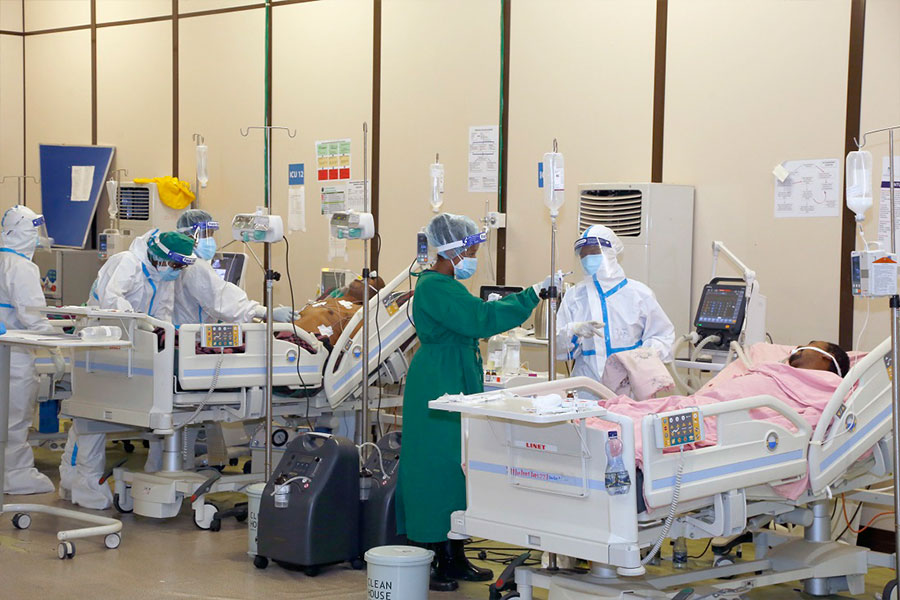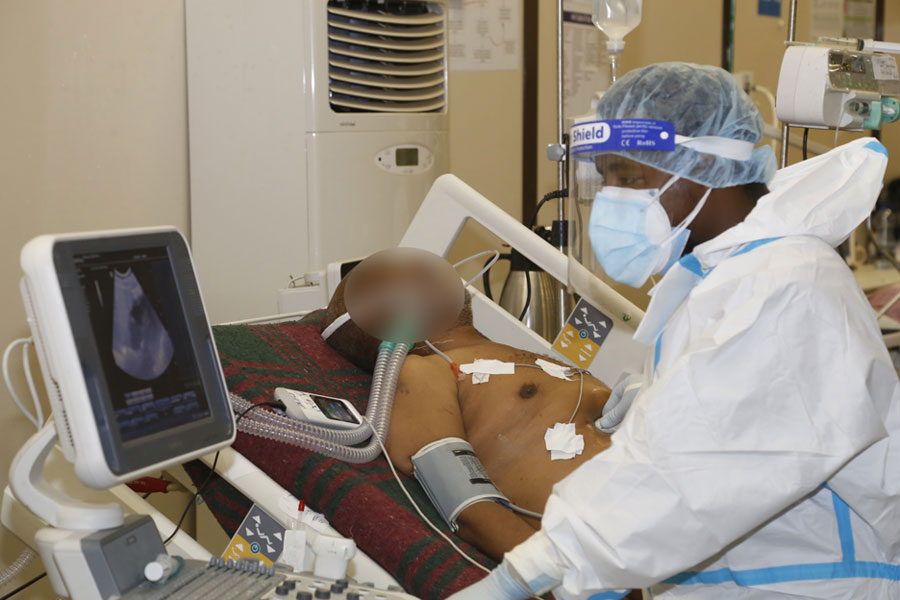
Agenda | Apr 03,2021
Apr 17 , 2020
By Christian Tesfaye
A crisis presents a test to society and individuals, and the Novel Coronavirus (COVID-19) pandemic is doing just that. It is showing us which economies work better and which are too speculative. It is laying bare how much the liberal world order has eroded and been replaced by the pragmatism of nationalism and how nations that are considered capable and resourceful are, at times, unprecedentedly vulnerable.
Plagues have historically been tools that substantially alter economic and political orders. But their most profound impact is on society and the psyche of individuals. COVID-19 is no different.
I was heading to the office the other day using one of the taxi-hailing services. At a traffic stop, the driver and I spotted some youth and Syrians, mostly women and children, approaching cars one by one selling items such as tissue paper and face masks. They were trying to survive in a strange and uncertain time, when business activity is depressed and an economic slowdown, if not recession, is set to disproportionately impact lower-income groups.
“If only they would use the police to kick and beat them, they wouldn't dare come out again,” the driver screamed unprovoked, obviously annoyed by what they were doing. “They speak with everyone and touch everything.”
On another occasion, talking with an acquaintance, I was presented with a chilling “solution” to the problem.
“It doesn’t matter if we are staying home all the time and washing hands,” he said. “Unless they force sex workers off the streets, it’s all for nothing.”
“But how would they continue to make a living?” I enquired. “Should there not be a plan in place first to ensure that they don’t starve?”
He did not think so.
“That would take too long - we have to choose,” he said. “Imagine one of them sleeps with a man, who then goes to infect his children, his wife, his maid. We have to choose.”
He is not wrong that these groups of people - street vendors, sex workers, minibus taxi drivers, waitresses - that are at the bottom of the economic scale are most exposed to COVID-19. They interact with too many people. The chances that they will catch it and give it to others is high.
But should this make them the enemy of the people? Do those who work these types of jobs do so because they enjoy them and have always aspired to them?
It is doubtful, and society needs to recognise this. Unavoidably, in times of crisis such as this, animal instincts kick in, and comes the temptation is to get rid of the problem in the most expedient manner possible, however crude and cruel it may be.
This is basic human nature, an instinct that was probably critical at some point in the evolutionary process. It is also one that, as conscious beings with a fairly good understanding of justice, democracy, fairness and the socio-political systems that increase the lot of some while reducing that of others, we should be ashamed of.
We risk compromising our moral values the second we begin to make the assumption that the lives of the few, for whatever reason, deserve to be sacrificed to save those of the majority. It is a slippery slope that has consistently led to the oppression, disenfranchisement and the loss of so many lives.
Every tyranny starts this way - with a society ready to accept the prosecution, abuse, exploitation or killing of the few for the sake of the “greater good.”
There is almost always a third way, a compromise that does not sacrifice anyone for the sake of everyone else. A little idealistic of a view, I admit, but extreme decisions should not be made without the utmost deliberation and a central body to take responsibility. The expedient path of sacrificing some for the sake of others should never be the default mode.
We should be able to support each other in times such as this, not resort to our basest instincts. This requires a conscious effort, a great deal of sympathy and the understanding that almost every society has already been through much worse.
PUBLISHED ON
Apr 17,2020 [ VOL
21 , NO
1042]


Agenda | Apr 03,2021

Verbatim | May 14,2022

Sunday with Eden | Jul 10,2020

Fortune News | Apr 03,2021

Editorial | Apr 25,2020

Editorial | Apr 25,2020

Life Matters | Aug 22,2020

Life Matters | Sep 17,2022

International Stories | Apr 16,2020

Viewpoints | Sep 10,2021

Photo Gallery | 174595 Views | May 06,2019

Photo Gallery | 164822 Views | Apr 26,2019

Photo Gallery | 155020 Views | Oct 06,2021

My Opinion | 136695 Views | Aug 14,2021
Editorial | Oct 11,2025

Dec 22 , 2024 . By TIZITA SHEWAFERAW
Charged with transforming colossal state-owned enterprises into modern and competitiv...

Aug 18 , 2024 . By AKSAH ITALO
Although predictable Yonas Zerihun's job in the ride-hailing service is not immune to...

Jul 28 , 2024 . By TIZITA SHEWAFERAW
Unhabitual, perhaps too many, Samuel Gebreyohannes, 38, used to occasionally enjoy a couple of beers at breakfast. However, he recently swit...

Jul 13 , 2024 . By AKSAH ITALO
Investors who rely on tractors, trucks, and field vehicles for commuting, transporting commodities, and f...

Oct 11 , 2025
Ladislas Farago, a roving Associated Press (AP) correspondent, arrived in Ethiopia in...

Oct 4 , 2025
Eyob Tekalegn (PhD) had been in the Governor's chair for only weeks when, on Septembe...

Sep 27 , 2025
Four years into an experiment with “shock therapy” in education, the national moo...

Sep 20 , 2025
Getachew Reda's return to the national stage was always going to stir attention. Once...

Oct 12 , 2025
Tomato prices in Addis Abeba have surged to unprecedented levels, with retail stands charging between 85 Br and 140 Br a kilo, nearly triple...

Oct 12 , 2025 . By BEZAWIT HULUAGER
A sweeping change in the vehicle licensing system has tilted the scales in favour of electric vehicle (EV...

A simmering dispute between the legal profession and the federal government is nearing a breaking point,...

Oct 12 , 2025 . By NAHOM AYELE
A violent storm that ripped through the flower belt of Bishoftu (Debreziet), 45Km east of the capital, in...